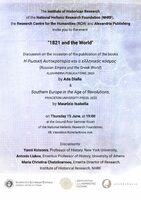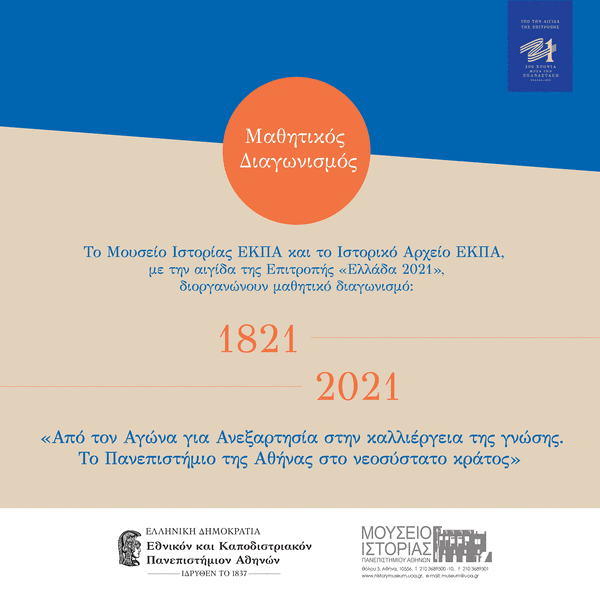Items
Item set
Universities - Research Centers: Conferences - events
-

1821 "Grasp education and freedom": Aspects of the Greek Revolution
Conference -

1821 and the World
Speech/Lecture -
Philhellenism and the Greek Revolution of 1821: Towards a Global History
Conference -
Workshop: 1821: What Made it Greek and Revolutionary?
Conference -
British philhellenism: The project
-
1821 Digital Archive
Speech/Lecture -
Power and impunity: what Donald Trump and Boris didn't learn from the ancient Greeks
Speech/Lecture -
The Greek War of Independence: reappraising its economic legacies
Speech/Lecture -
Revolution and empire in the Mediterranean: The Greek Revolution in context
Conference -
Greek America’s commemorations of 1821: the role of the Greek Orthodox Archdiocese from 1922 to the present
Conference presentation -
The Greek diaspora and the Greek Revolution
Conference -

1821-2021: From the struggle for independence to the cultivation of knowledge: The University of Athens in the newly established state
Webpage/blog -
The other Konstantinos Oikonomos “o ex Oikonomon”
Speech/Lecture -
The establishment of the Church of Greece: rival versions of Οrthodoxy, the nation and the revolution
Speech/Lecture -
The 25 March anniversary in the romantic years (1830-1880): rituals of memory and literary representations
Speech/Lecture -
Fustanellas and chlamydes: Historical memory and national identity in the first century of the life of the Greek state
Speech/Lecture -
A radical scholar in the footsteps of Rigas: Panagiotis Panas (1832-1896)
Speech/Lecture -
Searching for Europe in the years after the Revolution
Speech/Lecture -
The official language of the newly established Greek state
Speech/Lecture -
Press and freedom
Speech/Lecture -
Greek parliamentarism, 1843-2021: Normality and aberrations
Speech/Lecture -
The foreign origins of the Great Idea
Speech/Lecture -
The Great Idea, the University of Athens and the “progress of the nation” in the newly founded Greek kingdom
Speech/Lecture -
Ionian Sea, 1770-1864: The interpretation of the nation and the catalyst of the Revolution
Speech/Lecture -
An attempt to outline the life and work of Ioannis Kapodistrias
Kapodistrias’ great diplomatic and political skills, his personal talents, his selflessness, his great contribution to the liberated country do not need idealisation to be acknowledged. They emerge on their own from historical evidence and testimonies. This idealisation, sanctification even, which justifies all its government choices and parasitically or simply condemns any dissenting opinion or act, does not improve but damages his historical image. On the contrary, any unsubstantiated and one-sided criticism that focuses merely on his authoritarian or other choices without understanding the conditions that prevailed when Kapodistrias exercised power is unhistorical. Some thoughts will be expressed about the life and work of Kapodistrias: - How his personality was formed - His gradual progress in the Russian service - His role in the decisions of the great powers on the fate of post-war Europe - His personal life - His attitude towards the Philiki Etaireia and the Greek Revolution - His departure from the Russian service - His election as governor of Greece - His government policy. His ideology - Consents and reactions to this policy - The involvement of the three powers - The general changes in Europe in 1830-1831 and their impact on Greece - The deterioration in the relations between Kapodistrias and the opposition - His murder (Edited and translated description from organiser’s website)
